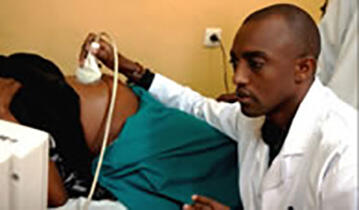
Scientists at the Liverpool School of Tropical Medicine and the University of Liverpool have found that an antibiotic, currently used to treat infections linked to incidences of premature births, does not help reduce the risk of preterm labour.
The antibiotic, called azithromycin, is effective in treating infections such as syphilis, Chlamydia and Ureaplasma urealyticum – a bacterial infection thought to play a significant role in causing preterm labour. Recent studies have also shown that the drug is effective in reducing the risk of miscarriage following amniocentesis, a medical test for infection and foetal abnormalities.
The drug is currently used to treat infection in patients all over the world, but has not been previously tested on pregnant women at high risk of preterm labour. Scientists at Liverpool investigated how effective the antibiotic could be in women in Southern Malawi, where one in five babies are born prematurely. Women living in this region are also at high risk of sexually transmitted infections and other diseases, which may have a significant impact on labour and the long-term development of a foetus.
In a study of 2,000 pregnant women, half were treated with the oral antibiotic and half were treated with placebo drugs. They found that the antibiotic made no significant difference to the outcome of the pregnancies between the two groups of women. A high number of women with infection still went on to experience preterm labour. The study suggests that it is important to investigate other factors, beside infection, to determine the cause of preterm labour.
Professor Jim Neilson, from the University’s School of Reproductive and Developmental Medicine, explains: “Labour that occurs before 37 weeks is defined as a preterm birth and is a major cause of infant death and illness. Currently there is no effective way to prevent premature births, but it is thought that infection could be a significant trigger. Although preterm labour is a problem all over the world, women in developing countries are at higher risk, perhaps because of the increased levels of infection, such as HIV and malaria.
“Infection can occur early in pregnancy and remain undetected, so one way of reducing incidences of preterm labour may be to administer antibiotics before patients display any signs of infection. Our study showed, however, that treating infection with azithromycin, had no impact on reducing incidences of preterm labour.”
“The results suggest that infection may not be the primary cause of preterm labour and other factors must be investigated further. We recommend that routine antibiotics should not be given to pregnant women to prevent early births.”
Dr Nynke van den Broek, from the Liverpool School of Tropical Medicine, added: “The data collected as part of the trial will be further analysed to determine which factors during pregnancy were associated with the occurrence of preterm birth in this group of women. The field site in Malawi is highly representative of other sub Saharan African settings and the information on risk factors as well as pregnancy outcome will be very valuable to inform future studies.”
The research will support work being conducted at a new centre dedicated to improving experiences in pregnancy and childbirth for women across the world. The Centre for Better Births will bring together researchers and clinicians to improve understanding in areas such as premature labour, recurrent miscarriage and prolonged labour.
The study is supported by the Wellcome Trust and published in PLoS Medicine.
-ends-
For further information, please contact:
Alan Hughes, Communications Manager
Office: +44 (0)151 705 3308
Mobile: +44 (0)7759 243969
Notes to Editors
Liverpool School of Tropical Medicine (LSTM) has been engaged in the fight against infectious, debilitating and disabling diseases for more than a hundred years and continues that tradition today with a research portfolio in excess of £130 million and a teaching programme attracting students from over 70 countries.
The University of Liverpool is a member of the Russell Group of leading research-intensive institutions in the UK. It attracts collaborative and contract research commissions from a wide range of national and international organisations valued at more than £93 million annually.
The University is currently fundraising for the construction of the Centre for Better Birth and has so far raised £1 million. For further information or to discuss how to support the Better Births Appeal, contact Helen O’Donnell on 0151 794 6987 or visit the website at www.liv.ac.uk/better-births